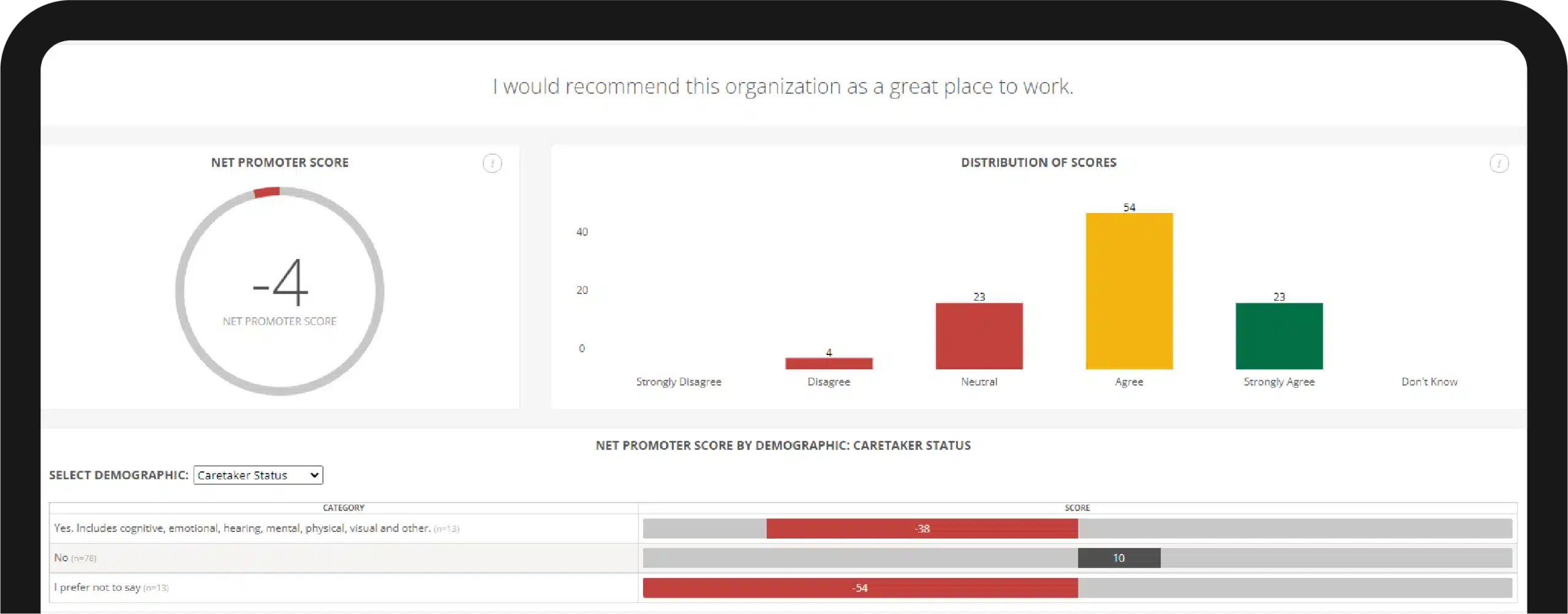Unlocking the Potential of Employee Net Promoter Score (eNPS)
Discover how eNPS gauges employees’ readiness to advocate their workplace to friends, influencing workplace satisfaction.

Enhance your continuous employee experience program with eNPS, a vital tool alongside annual engagement surveys. Swiftly providing leaders with immediate insights, eNPS identifies potential issues faster than other metrics, ensuring a proactive approach to employee satisfaction and workplace improvement.

What is Employee Net Promoter Score (eNPS)?
eNPS, or Employee Net Promoter Score, measures employee advocacy for their workplace. As a derivative of the widely-used NPS, it gauges willingness to recommend the company to peers. Developed in the ’90s, NPS focuses on one pivotal question: ‘Would you recommend our company to others?’ eNPS functions similarly, reflecting employee sentiment.
The eNPS question mirrors the structure: ‘Would you recommend this organization as a great place to work?’ This query, akin to NPS, assesses employee inclination to endorse the workplace, aiding in understanding the overall sentiment and loyalty of the workforce.
Decoding the Scoring of Employee Net Promoter Score (eNPS)
Similar to the NPS calculations, employee answers are then divided into three categories:
Employees considered detractors are typically disengaged and unhappy within their organization. Furthermore, they often say negative things about work, leadership, and the company. This can cause them to have a negative influence on other employees, even bringing once engaged employees down to their level.
Passive employees aren’t actively detracting from the organization but aren’t doing much to positively contribute either. While they may meet the general parameters found under the definition of employee satisfaction, they are unlikely to promote the organization or exhibit true employee loyalty/engagement.
Promoters are the exact type of employee organizations wish to cultivate. These are the most loyal employees within a company with high engagement levels and are those that have embraced the company culture and seek to share their loyalty to the organization both inside and out. It’s important for organizations to garner employee feedback from these individuals and use their input to increase satisfaction companywide.
Unveiling the Calculation of Employee Net Promoter Score (eNPS)
eNPS = share “Promoters”(%) – share “Detractors”(%)
eNPS rates from -100 to 100, assessing the ratio between Promoters and Detractors. Scores above 30 indicate positivity, while lower scores suggest negativity. This scale provides a clear gauge of employee sentiment, guiding actions to enhance workplace satisfaction and loyalty.
Understanding the Importance: Why Care About eNPS?
- Actionable insights with data on regular intervals
- Managers and leaders readily understand eNPS
- Trends can be spotted quickly
eNPS provides insights into employees’ job satisfaction. While akin to employee NPS in gauging sentiment, its primary value lies in catalyzing deeper engagement exploration within your organization. It acts as a trigger for comprehensive dives into employee engagement, fostering a proactive approach to workplace enhancement and employee fulfillment.
DecisionWise specializes in leveraging eNPS to boost overall employee engagement. We employ comprehensive surveys, probing diverse aspects of engagement to pinpoint your organization’s stance on the engagement spectrum. These surveys empower your employees to voice their opinions, ultimately fortifying the eNPS score, fostering a more engaged and empowered workforce.